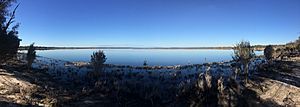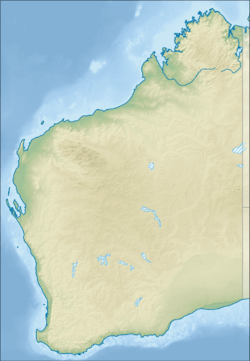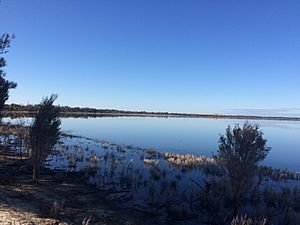Wagin Lake facts for kids
Quick facts for kids Wagin Lake |
|
|---|---|

Wagin Lake panorama 2018
|
|
| Location | Wheatbelt, Western Australia |
| Coordinates | 33°19′35″S 117°20′50″E / 33.32639°S 117.34722°E |
| Type | saline |
| Primary inflows | Groundwater and surface runoff |
| Catchment area | 2,300 ha (5,700 acres) |
| Basin countries | Australia |
| Surface area | 46 to 63 ha (110 to 160 acres) |
Wagin Lake is a salt lake in Western Australia. It is usually dry. The lake is on the southern edge of the town of Wagin. This town is about 228 kilometers (142 miles) southeast of Perth. A special nature reserve, the Wagin Lake Nature Reserve, is next to the lake. It covers about 1.14 square kilometers.
Contents
About Wagin Lake
Who are the Traditional Owners?
The Noongar people are the traditional owners of this land. They have lived here for a very long time. The area around Wagin Lake is important to them. There are many ancient Aboriginal sites in the shire. Some of these sites are found around the lake itself.
What Does the Name "Wagin" Mean?
The name "Wagin" comes from the Noongar language. It was first written down by a surveyor between 1869 and 1872. The name means "place of emus." It can also mean "site of the foot tracks from when the emu sat down." The town of Wagin got its name from this lake.
Where is Wagin Lake Located?
Wagin Lake is part of a chain of wetlands. These wetlands follow old water paths in the area. They stretch from Dumbleyung in the north. They go all the way south of Wagin. The Shire of Wagin has many large lakes and wetlands. These include parts of Lake Dumbleyung, Parkeyerring Lake, and Lake Norring.
These lakes are part of the Blackwood River system. However, the land is very flat. There is also not much rain. Because of this, the eastern creeks and rivers rarely flow into the Blackwood River.
How Does the Lake Get Water?
The area around Wagin Lake that collects water is called its catchment. This catchment covers about 2,300 hectares. The area gets about 433 millimeters (17 inches) of rain each year. But a lot of water evaporates, about 1,873 millimeters (74 inches) per year. The land around the lake has flat plains and sand dunes. These are made of old soil and wind-blown sand.
Wildlife at Wagin Lake
What Happens When Wagin Lake Fills Up?
Wagin Lake is usually dry. But in February 2017, heavy floods filled the lake completely. It stayed full for over a year. When the lake has water, it becomes a home for many birds. Large groups of black swans came to the lake. You could also see egrets and different types of ducks.
What Animals Live in the Lake?
When Wagin Lake has water, it provides a habitat for many species. You might see birds like the grey teal and pacific black duck. Other birds include the eurasian coot and hoary-headed grebe. Pied stilts, white-faced heron, great egret, and yellow-billed spoonbill also visit the lake.



